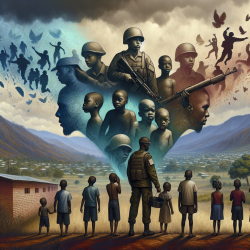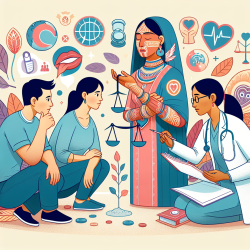The issue of stigma experienced by peacekeeper-fathered children and their mothers in Haiti is a significant concern that has been explored in recent research. This blog post delves into the findings of the study titled “It’s because We are ‘Loose Girls’ That’s why We had Children with MINUSTAH Soldiers”: A Qualitative Analysis of Stigma Experienced by Peacekeeper-Fathered Children and Their Mothers in Haiti. The research provides valuable insights that can help practitioners improve their skills in supporting these communities.
The Research Context
The study focuses on the stigma faced by children fathered by UN peacekeepers and their mothers in Haiti. Using qualitative interviews with 18 Haitian women, the research applied Link and Phelan’s conceptual model of stigma to understand the stigmatization process. The findings highlight the themes of labeling, stereotyping, separation, and status loss and discrimination.
Key Findings
- Labeling: The study found that peacekeeper-fathered children were often labeled as "children of MINUSTAH," which highlighted their foreign ancestry and the absence of their fathers. This label was associated with negative consequences such as discrimination and social exclusion.
- Stereotyping: Mothers were stereotyped as "loose girls," implying promiscuity and voluntary engagement with peacekeepers. This stereotype ignored the power dynamics and coercion involved in these relationships.
- Separation: The research revealed a clear separation between these mothers and other women in the community, exacerbated by perceptions of sexual agency and choice.
- Status Loss and Discrimination: The culmination of labeling and stereotyping resulted in significant status loss for both mothers and children, leading to public humiliation, reduced help-seeking behavior, and limited resource utilization.
Implications for Practitioners
The findings suggest several ways practitioners can enhance their support for affected individuals:
- Acknowledge Stigma: Recognizing stigma as a fundamental protection concern is crucial. Practitioners should work to address stigma at both individual and community levels through education and advocacy.
- Psycho-social Support: Providing psycho-social support to help individuals cope with internalized stigma can be beneficial. This includes counseling services that address feelings of shame or guilt.
- Cultural Sensitivity: Understanding the cultural context is essential. Practitioners should be aware of local perceptions and work alongside community organizations to develop effective interventions.
- Advocacy for Policy Change: Engaging in advocacy efforts to hold international bodies accountable for providing long-term support to peacekeeper-fathered children can drive systemic change.
The research underscores the importance of addressing stigma as part of broader efforts to support SEA survivors and their children. By applying these insights, practitioners can contribute to more effective interventions that promote healing and empowerment.
To read the original research paper, please follow this link: “It’s because We are ‘Loose Girls’ That’s why We had Children with MINUSTAH Soldiers”: A Qualitative Analysis of Stigma Experienced by Peacekeeper-Fathered Children and Their Mothers in Haiti.










